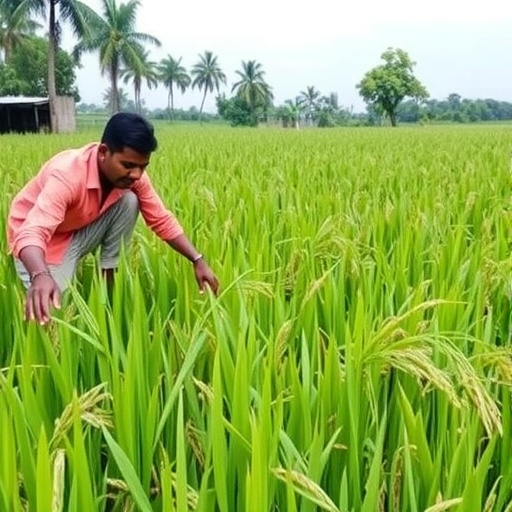In the heart of Bangladesh, where rice serves as a staple food and a cultural symbol, a groundbreaking study is unraveling the genetic potential of local and advanced Aman rice genotypes. Conducted by a team of researchers led by R. Islam, the study offers a comprehensive genetic and multivariate analysis that sheds light on the adaptability and yield potential of these rice varieties. As climate change poses significant challenges to agricultural productivity, this research provides crucial insights that could help enhance food security in the region.
The researchers meticulously selected a diverse set of Aman rice genotypes, which are not only endemic to Bangladesh but also have been improved through modern breeding techniques. This blend of local and advanced varieties presents an opportunity to analyze the genetic traits that contribute to their resilience and productivity under varying environmental conditions. By focusing on Aman rice, the team aims to uncover the intricacies of genetic diversity that can be leveraged to improve rice cultivation practices.
Utilizing advanced genetic analysis tools, the research dives deep into the hereditary traits of the selected genotypes. Techniques such as molecular markers and DNA sequencing were employed to unravel the complex genetic makeup of these rice varieties. This approach reveals polymorphic traits that contribute to important agronomic characteristics like disease resistance, drought tolerance, and overall yield. The results of these analyses are vital for breeders looking to develop new rice varieties that are better suited to the changing climate.
Moreover, the multivariate analysis conducted alongside genetic examinations provides a holistic view of the interplay between different traits and environmental factors. By evaluating multiple variables simultaneously, the researchers can identify which genetic traits have the most significant impact on rice performance. This multidimensional perspective is essential for creating targeted breeding programs aimed at enhancing specific agronomic traits while maintaining the nutritional quality of the rice.
The study also emphasizes the importance of local genetic resources in breeding programs. With many farmers relying on traditional rice varieties, understanding the genetic background of these local breeds is critical. The research highlights how local varieties hold unique adaptations to specific local conditions that advanced varieties may lack. This insight encourages the integration of local genetics into broader breeding strategies, merging traditional knowledge with modern scientific approaches.
As climate variability continues to threaten agricultural systems globally, the implications of this research extend beyond Bangladesh. By better understanding how rice genotypes react to environmental stresses, the findings can be leveraged to develop globally applicable strategies for rice cultivation. This not only supports Bangladesh’s food security efforts but also contributes valuable knowledge to global rice research communities facing similar challenges.
Furthermore, the collaborative nature of the research team adds strength to the findings. Comprising researchers with diverse expertise, including plant breeding, molecular biology, and agronomy, the study embodies an interdisciplinary approach that is becoming increasingly vital in addressing complex agricultural issues. By pooling their knowledge and resources, the team can tackle challenges from multiple angles, resulting in more robust conclusions and recommendations.
Another noteworthy aspect of the research is its alignment with global sustainability goals. As nations strive to achieve food security in an environmentally sustainable manner, the insights gained from this study could play a crucial role in informing policy decisions and agricultural practices. The emphasis on genetic diversity as a buffer against climate change impacts resonates with the broader objectives of promoting biodiversity preservation alongside food production increases.
In practice, the outcomes of this research could influence the cultivation methods employed by farmers in Bangladesh. Enhanced understanding of which genotypes thrive under adverse conditions can guide farmers in selecting the most appropriate varieties to plant each season. This could result in more resilient agricultural systems and help mitigate the impacts of climate fluctuations on yield.
In conclusion, the significant contributions of this research not only strengthen the foundations of rice breeding in Bangladesh but also highlight the critical need for ongoing studies into genetic diversity. The successful integration of genetic and multivariate analysis opens new avenues for enhancing the productivity and sustainability of rice farming. As the world grapples with climate change and food security challenges, studies like this one will be instrumental in shaping the future of agriculture.
By putting the spotlight on genetically diverse Aman rice genotypes, the research aims to encourage both farmers and scientists to embrace a more resilient agricultural framework. The blend of local wisdom and advanced research techniques is making strides in overcoming one of nature’s most pressing challenges—ensuring that rice, as a vital food source, continues to thrive no matter the conditions it faces.
Ultimately, the work of Islam and his team serves to remind us of the profound connection between agriculture, genetics, and sustainability. In their quest to improve local rice varieties, they are not only enhancing the lives of Bangladeshi farmers but also contributing to the global understanding of food systems. With ongoing research and collaboration, the potential for innovation in rice agriculture is vast.
Research in this field serves as a beacon of hope for future generations, emphasizing the importance of genetic resources and the significance of local wisdom in shaping resilient food systems. As we move forward, the findings from this study will undoubtedly help build a more food-secure and sustainable world, one rice grain at a time.
Subject of Research: Genetic and multivariate analysis of Aman rice genotypes in Bangladesh.
Article Title: Genetic and multivariate analysis of some local and advanced selected Aman rice genotypes under Bangladesh condition.
Article References:
Islam, R., Hossain, M.S., Aktar, S. et al. Genetic and multivariate analysis of some local and advanced selected Aman rice genotypes under Bangladesh condition.
Discov. Plants 2, 271 (2025). https://doi.org/10.1007/s44372-025-00352-8
Image Credits: AI Generated
DOI: 10.1007/s44372-025-00352-8
Keywords: Aman rice, genetic analysis, multivariate analysis, climate change, Bangladesh




